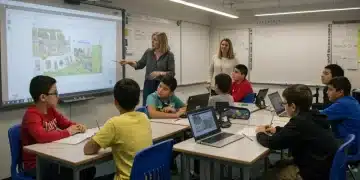New Research: Parental Involvement Boosts Student Success

Breaking news in educational research confirms what many educators and parents have long suspected: New Research: The Impact of Parental Involvement on Student Success is undeniably significant. Recent findings provide compelling evidence that active engagement from families profoundly influences academic achievement, behavioral development, and overall student well-being.
Understanding the Core of Parental Involvement
Parental involvement encompasses a wide range of activities, from helping with homework to attending school events and communicating regularly with teachers. This engagement creates a supportive ecosystem around the child, reinforcing learning at home and school. The latest studies delve into the nuances of these interactions, identifying specific types of involvement that yield the most substantial benefits for students across various age groups and socioeconomic backgrounds.
Researchers are now categorizing parental involvement beyond just physical presence, examining the quality and nature of the engagement. This includes emotional support, academic socialization, and fostering a positive attitude towards education within the home environment. The data consistently points to a direct correlation between higher levels of meaningful parental engagement and improved educational outcomes.
Defining Effective Parental Engagement
Effective parental engagement isn’t a one-size-fits-all approach; it adapts to the child’s age and developmental stage. For younger children, it might involve reading aloud daily, while for adolescents, it could mean discussing career aspirations or helping navigate complex assignments. The key lies in consistent, positive interaction that communicates the value of education.
- Academic Socialization: Parents conveying high educational expectations and discussing school-related issues.
- Home Learning Environment: Providing resources, a quiet study space, and a routine for homework.
- School Communication: Regular dialogue with teachers and school administration about student progress.
- Volunteerism: Participating in school activities, parent-teacher associations, or classroom support.
Academic Outcomes: A Direct Correlation
The new research unequivocally demonstrates a strong link between parental involvement and enhanced academic performance. Students whose parents are actively engaged tend to achieve higher grades, score better on standardized tests, and have lower dropout rates. This impact is observed across all grade levels, from early childhood education through high school.
One pivotal study, published this month, tracked thousands of students over a decade, revealing that students with highly involved parents were 30% more likely to pursue higher education. This isn’t solely about direct academic help but also about the creation of an environment that values learning and intellectual curiosity. Parents serve as crucial motivators and advocates, helping their children overcome academic challenges and celebrate successes.
Impact on Literacy and Numeracy
Early parental involvement, particularly in literacy and numeracy activities, lays a strong foundation for future academic success. Children whose parents read to them regularly or engage them in number games before school often enter kindergarten with a significant advantage. These early interactions build essential cognitive skills and foster a love for learning.
Furthermore, this early engagement helps children develop a positive self-concept as learners, reducing anxiety around academic tasks. The continuity of learning between home and school creates a seamless educational experience, where concepts are reinforced and expanded upon in both settings. This collaborative approach ensures that children receive consistent support and encouragement.
Behavioral and Socio-Emotional Benefits
Beyond academics, parental involvement plays a critical role in shaping a child’s behavior and socio-emotional development. Studies indicate that students with engaged parents exhibit fewer behavioral problems, higher self-esteem, and improved social skills. This holistic development prepares them not just for school, but for life.
When parents are involved, children often feel more secure and valued, which translates into better classroom conduct and a greater willingness to participate. This supportive home environment acts as a buffer against negative influences and helps children develop resilience. The consistent presence of caring adults provides a stable foundation for emotional growth.

Fostering Positive Relationships
Parental involvement also strengthens the parent-child bond, fostering open communication and mutual respect. Children are more likely to confide in their parents about school-related issues, whether academic or social, when they feel their parents are genuinely interested and supportive. This open dialogue is crucial for addressing problems early and preventing them from escalating.
- Reduced Absences: Involved parents often ensure better attendance rates, understanding the importance of consistent schooling.
- Improved Self-Regulation: Children learn self-discipline and responsibility from parental guidance and structure.
- Enhanced Social Skills: Parents model positive social interactions and help children navigate peer relationships.
Challenges and Disparities in Involvement
While the benefits are clear, the research also highlights significant challenges and disparities in parental involvement. Socioeconomic status, parental education levels, and work schedules can all impact a family’s ability to engage with their child’s schooling. Schools and policymakers are now exploring strategies to bridge these gaps, ensuring all students can benefit from parental support.
Efforts include providing flexible meeting times, offering resources in multiple languages, and creating community programs that support families. The goal is to make involvement accessible and meaningful for all parents, recognizing that different families have different capacities and needs. Addressing these disparities is crucial for equitable educational outcomes.
Overcoming Barriers to Engagement
Many parents face legitimate barriers to involvement, such as demanding work schedules, lack of transportation, or language barriers. Schools are increasingly adopting innovative approaches to overcome these obstacles, including virtual parent-teacher conferences and online resources. Building trust and open communication between home and school is paramount.
Furthermore, some parents may feel intimidated by the school environment due to their own past negative experiences. Creating a welcoming and inclusive atmosphere is essential for encouraging their participation. Providing workshops on how to support learning at home can also empower parents who feel less confident in their ability to help.
The Role of Schools in Fostering Engagement
Schools play a pivotal role in facilitating and encouraging parental involvement. Effective schools actively reach out to parents, creating partnerships that support student learning. This includes clear communication channels, inviting parents to participate in decision-making, and offering workshops on how to best support their children academically and emotionally.
Programs that train teachers in effective parent communication and engagement strategies are proving particularly successful. When teachers and parents work together, they form a powerful team dedicated to the child’s success. This collaborative approach fosters a sense of shared responsibility for educational outcomes.
Strategies for School-Parent Partnerships
Successful school-parent partnerships are built on mutual respect and shared goals. Schools can implement various strategies to foster stronger connections with families, ensuring that parental involvement is not just encouraged but actively supported and integrated into the school’s culture.
- Open Communication: Regular newsletters, parent portals, and accessible teacher contact information.
- Parent Workshops: Sessions on topics like navigating school systems, supporting homework, or understanding curriculum changes.
- Family Events: School festivals, cultural nights, and academic showcases that invite family participation.
- Decision-Making Roles: Including parents on school committees and advisory boards.
Policy Implications and Future Directions
The compelling evidence from recent research has significant implications for educational policy. Policymakers are now considering how to best support and incentivize parental involvement through funding for family engagement programs, professional development for educators, and community-based initiatives. The focus is shifting towards creating systemic supports that make parental involvement a cornerstone of educational strategy.
Future research will likely delve deeper into the long-term effects of different types of parental involvement, as well as explore how technology can further enhance home-school connections. Understanding these dynamics will enable the development of even more effective strategies to harness the power of parental engagement for student success.
Investing in Family Engagement Programs
Governments and educational bodies are increasingly recognizing the value of investing in programs specifically designed to boost family engagement. These programs can range from home visiting initiatives for early childhood development to mentorship programs for parents of high school students. Such investments are seen as crucial for improving overall educational equity and outcomes.
The goal is to move beyond mere encouragement to providing concrete resources and support that empower parents to become effective partners in their children’s education. This includes funding for parent resource centers, literacy programs for adults, and initiatives that help parents navigate complex educational systems. By investing in families, we invest in the future of our students.
| Key Aspect | Brief Description |
|---|---|
| Academic Gains | Students with involved parents show higher grades, better test scores, and reduced dropout rates across all levels. |
| Behavioral Improvements | Engaged parenting correlates with fewer behavioral issues, increased self-esteem, and enhanced social skills in children. |
| School Partnership | Schools actively fostering parent engagement see greater student success, emphasizing communication and collaborative efforts. |
| Policy Implications | New findings advocate for policies and funding to support family engagement programs and educator training. |
Frequently Asked Questions About Parental Involvement
Parental involvement, as defined by recent studies, goes beyond just attending school meetings. It includes active engagement in a child’s academic socialization, creating a supportive home learning environment, consistent communication with schools, and volunteering, all tailored to the child’s developmental stage.
Engaged parents often establish routines, provide resources, and communicate high educational expectations. This support leads to higher grades, better test scores, and reduced dropout rates, fostering a positive attitude towards learning and reinforcing school lessons at home.
Yes, research indicates that academic socialization (discussing school), creating a positive home learning environment, and consistent school communication are particularly effective. The most impactful involvement adapts as children grow, focusing on age-appropriate support and encouragement.
Beyond academics, parental involvement contributes to improved child behavior, higher self-esteem, and enhanced social skills. It fosters a sense of security and value in children, leading to better classroom conduct, increased resilience, and stronger parent-child bonds.
Schools can foster involvement by offering flexible meeting times, providing resources in multiple languages, and hosting inclusive community programs. Training teachers in effective parent communication and creating a welcoming, non-intimidating environment are also crucial for engaging all families.
Looking Ahead: Sustaining the Momentum of Parental Engagement
The latest research on New Research: The Impact of Parental Involvement on Student Success paints a clear picture: active family engagement is not just beneficial, but essential. What happens next involves a concerted effort from educators, policymakers, and communities to translate these findings into actionable strategies. We can expect to see increased investment in programs that bridge disparities in involvement, ensuring every family has the resources and support needed to participate meaningfully in their child’s education. This collective commitment will be vital in fostering environments where all students can thrive academically and personally, setting the stage for a brighter future.





